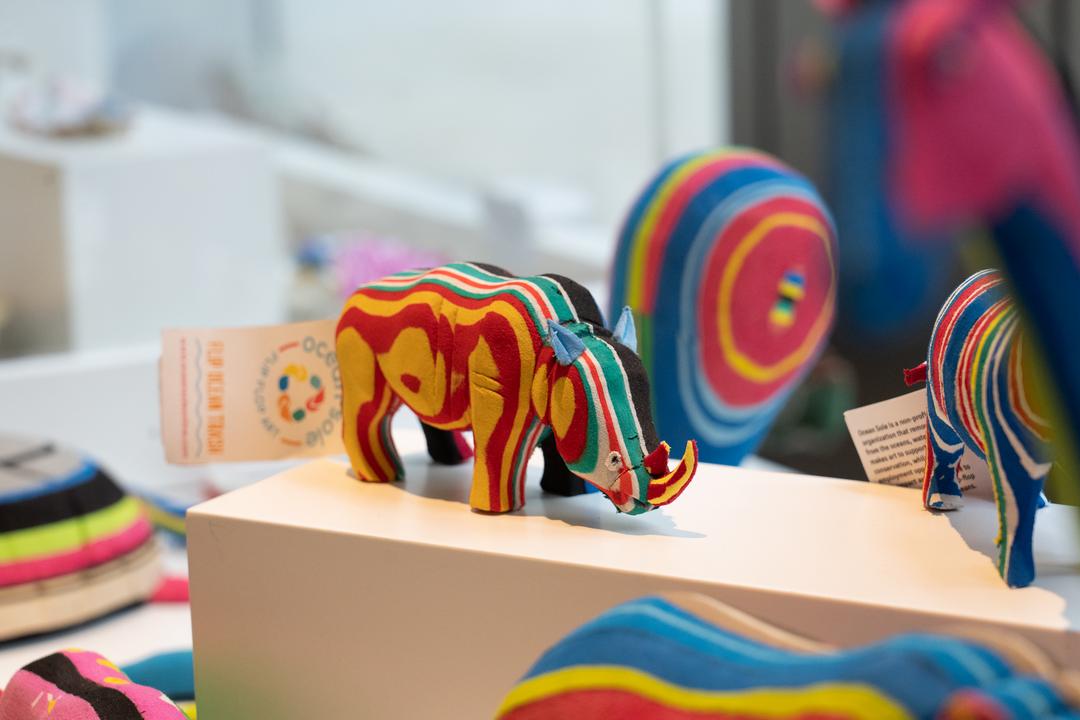The focus of Environment Day 2020 is our human need and dependency on Nature in all its glory - specifically, biodiversity. From the food, we eat to the medicines we take -biodiversity can be felt everywhere. Currently, our world is in the middle of not just a pandemic but also a biodiversity crisis. The Intergovernmental Science-Policy and Platform on Biodiversity and Ecosystem Series (IPBES) found that ‘one million species are threatened with extinction’. This is sad news indeed, and at Ocean Sole Africa, we are keen to raise awareness of the plight of our planet.
Pollution, including from chemicals and waste, is one of the critical drivers of global biodiversity loss. This is very front of our mind here at Ocean Sole.
Our entire recycled flip-flop art conservation project is all about taking flip flop debris and making conservation art – endangered species to bring awareness to marine conservation. We are often asked, why are flip flops so dangerous to Nature. Well, they are. Flip flops are made from a variety of materials but mostly oil-based rubber, plastic (PVC) and foam. The flip flops we find on our beaches are mostly made from a polyurethane resin, which makes them difficult to discard, and they persist in landfills for a very long time. Ultimately these landfills leak and the flip flops get into the Earth’s waterways, rivers and ultimately our oceans. These non-recyclable flip flops wreak havoc on marine life and sometimes even humans.
What the flip flop?
Yes, it’s true, over 7 billion flip flops are made per year to meet the demand of hot emerging high impact communities for shoes. These flip flops are worn and then discarded in domestic trash solutions, ultimately making their way to landfills and then into our waterways. Our communities find flip flops in the beaches, rivers, waterways, side of the road, landfills, local collection points, and even floating in the Ocean.
At Ocean Sole we recycle over 1 ton of flip flops a week into recycled art. That’s a lot, and we are just a small little project in Kenya. Imagine where the rest of these flip flops are—India, Malaysia, China, Seychelles, Caribbean, South America, anywhere there are warm climates and beaches. We hope our art brings awareness to both the impact on our marine life but by making art, we focus on endangered species too.
With consumerism for material goods made from plastic on the increase we see a devastating impact on Nature - on both land and under the water. Since 1980 marine plastic pollution has increased tenfold since 1980 affecting at least 267 animal species, including 86% of marine turtle, 44% of seabirds and 43% of marine mammals. (source UNEP). This is shocking, and all require an action of us.

What the flip flop? Exactly.
At Ocean Sole, we love the work we do to raise awareness of this flip flop debris problem. In Kenya, two years ago, our country declared no more plastic bags in the country. It took just 30 days for it to be smoothly adopted. Now as of today, Environment Day June 5, 2020, single-use plastic is banned on our beaches and coastal communities to protect our marine wildlife. This is excellent news and extraordinary for our home country, Kenya, to be leading in this effort, we are all very proud.
Let’s all make a commitment to change our ways and act this Environment Day. Let’s do it for Nature. The fish. The birds. The bees. The flowers. The reptiles. The mammals. The plants. The crops. The Planet. For each other.
Things we can do to help our Nature and reduce our ecological footprint and conserve Nature:
- Reduce. Reuse. Recycle. Limit single-use plastic consumption and properly dispose of it if you must use it
- Donate, recycle and repair electronic devices
- Volunteer with litter clean-ups – beaches, rivers, heavily littered areas
- Buy used or recycled toys or clothes
- Plant wildflowers, fruit trees and pollinator-friendly plants
- Build bat houses, birdhouses and ‘bee hotels’ in your garden
- Respect wildlife and act on your ideal conservation project
- Start conservation or eco-club to bring attention to your cause
- Resist throwing toxic materials in the domestic garbage put inappropriate disposal facility
- Eliminate dependency on pesticides








